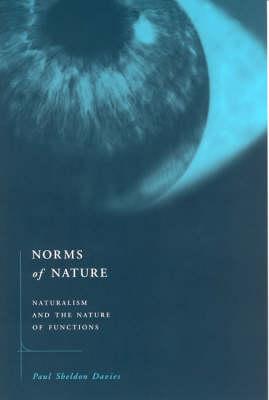Overview
The components of living systems strike us as functional - as for the sake of certain ends - and as endowed with specific norms of performance. The mammalian eye, for example, has the function of perceiving and processing light, and possession of this property tempts us to claim that token eyes are supposed to perceive and process light. That is, we tend to evaluate the performance of token eyes against the norm described in the attributed functional property. Hence the norms of nature. What, then, are the norms of nature? Whence do they arise? Out of what natural properties or relations are they constituted? In ""Norms of Nature"", Paul Sheldon Davies argues against the prevailing view that natural norms are constituted out of some form of historical success - usually success in natural selection. He defends the view that functions are nothing more than effects that contribute to the exercise of some more general systemic capacity. Natural functions exist insofar as the components of natural systems contribute to the exercise of systemic capacities. This is so irrespective of the system's history. Even if the mammalian eye had never been selected for, it would have the function of perceiving and processing light, because those are the effects that contribute to the exercise of the visual system. The systemic approach to conceptualizing natural norms, claims Davies, is superior to the historical approach in several important ways. Especially significant is that it helps us understand how the attribution of functions within the life sciences coheres with the methods and ontology of the natural sciences generally.
Full Product Details
Author: Paul Sheldon Davies (College of William And Mary)
Publisher: MIT Press Ltd
Imprint: Bradford Books
Edition: New edition
Dimensions:
Width: 15.20cm
, Height: 0.90cm
, Length: 22.90cm
Weight: 0.340kg
ISBN: 9780262541442
ISBN 10: 0262541440
Pages: 250
Publication Date: 24 January 2003
Recommended Age: From 18 years
Audience:
College/higher education
,
Professional and scholarly
,
Undergraduate
,
Postgraduate, Research & Scholarly
Format: Paperback
Publisher's Status: No Longer Our Product
Availability: Out of stock

The supplier is temporarily out of stock of this item. It will be ordered for you on backorder and shipped when it becomes available.
Reviews
"""Davies does an admirable job of explaining and defending his particular vision of [the systemic capacity] theory and its place in the natural sciences."" - R. K. Harris, Choice"
Davies does an admirable job of explaining and defending his particular vision... -- R.K. Harris, Choice
Author Information
Paul Sheldon Davies is Associate Professor of Philosophy at the College of William and Mary.



